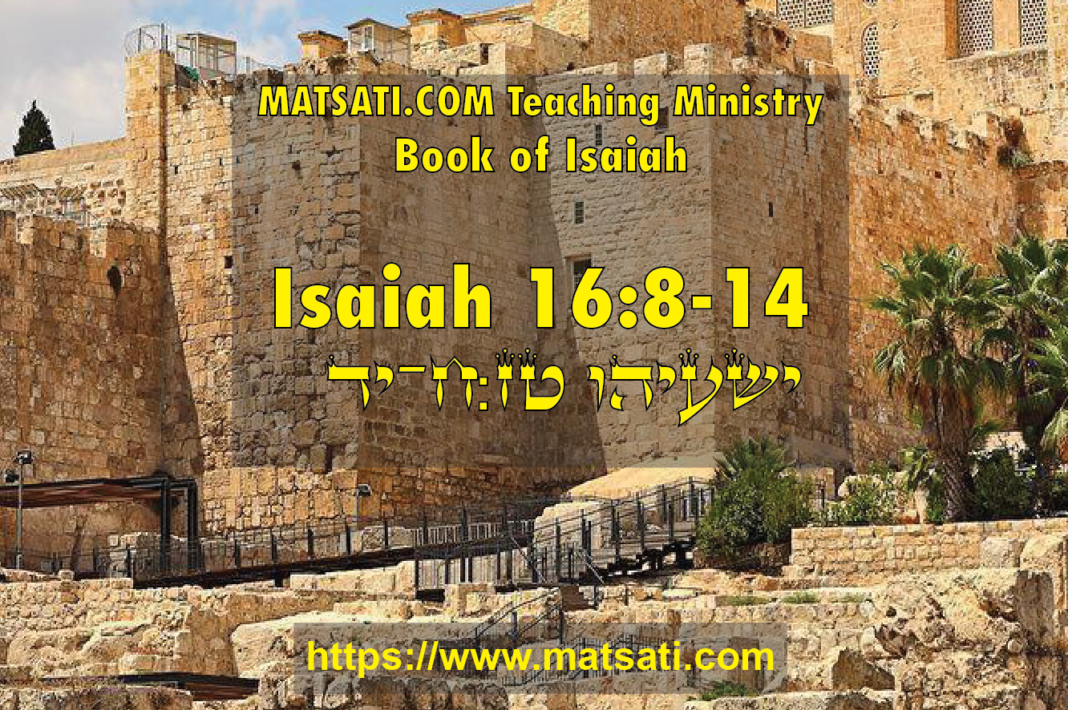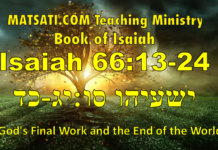Isaiah 16:8-14
Previously, Isaiah 16:1-5 appears to be Isaiah pleading with Judah to take in the refugees of Moab. The remainder of these verses Isaiah 16:8-14 we see what happens in Judah’s response to the previous request. We note the messianic flavor of the TgJ which interprets the word כַר in Isaiah 16:1 is a reference to the Messiah (לִמשִיחָא) saying, א יְהֹון מַסְקֵי מִסִין לִמשִיחָא דְיִשׂרָאֵל דְתַקֵיף עַל דַהְוָה כְמַדבְרָא טוּר כְנִשתָא דְצִיֹון׃ 16:1 They shall bring tributes to the Messiah of Israel, who shall prevail over those who are in the wilderness, unto the mountain of the congregation of Zion. (TgJ) The word כַר “lamb” is representative of the Messiah who goes forth to deliver those who are in need and seek the God of Israel. These things speak to the overarching theme of all of the Scriptures, that God is calling out to all men to come to Him. This is emphasized in Isaiah 2:2 (see https://www.matsati.com/index.php/isaiah-21-11/) which states, “And it shall come to pass (וְהָיָ֣ה׀) in the last days, (בְּאַחֲרִ֣ית הַיָּמִ֗ים) That the mountain of the Lord’s house shall be established (נָכ֨וֹן יִֽהְיֶ֜ה הַ֤ר בֵּית־יְהוָה֙) in the top of the mountains, (בְּרֹ֣אשׁ הֶהָרִ֔ים) And shall be exalted above the hills; (וְנִשָּׂ֖א מִגְּבָע֑וֹת) And all nations shall flow unto it. (וְנָהֲר֥וּ אֵלָ֖יו כָּל־הַגּוֹיִֽם)“ Isaiah goes on saying, Isaiah saying, 2:3 “And many people shall go and say, (וְֽהָלְכ֞וּ עַמִּ֣ים רַבִּ֗ים וְאָמְרוּ֙) Come ye, and let us go up to the mountain of the Lord, (לְכ֣וּ׀ וְנַעֲלֶ֣ה אֶל־הַר־יְהוָ֗ה) To the house of the God of Jacob; (אֶל־בֵּית֙ אֱלֹהֵ֣י יַעֲקֹ֔ב) And he will teach us of his ways, (וְיֹרֵ֙נוּ֙ מִדְּרָכָ֔יו) And we will walk in his paths: (וְנֵלְכָ֖ה בְּאֹרְחֹתָ֑יו) For out of Zion (כִּ֤י מִצִּיּוֹן֙) shall go forth the law, (תֵּצֵ֣א תוֹרָ֔ה) And the word of the Lord from Jerusalem. (וּדְבַר־יְהוָ֖ה מִירוּשָׁלִָֽם)” and 2:4 “And he shall judge among the nations, (וְשָׁפַט֙ בֵּ֣ין הַגּוֹיִֽם) And shall rebuke many people: (וְהוֹכִ֖יחַ לְעַמִּ֣ים רַבִּ֑ים) And they shall beat their swords into plowshares, (וְכִתְּת֨וּ חַרְבוֹתָ֜ם לְאִתִּ֗ים) And their spears into pruninghooks: (וַחֲנִיתֽוֹתֵיהֶם֙ לְמַזְמֵר֔וֹת) Nation shall not lift up sword against nation, (לֹא־יִשָּׂ֨א ג֤וֹי אֶל־גּוֹי֙ חֶ֔רֶב) Neither shall they learn war any more. (וְלֹא־יִלְמְד֥וּ ע֖וֹד מִלְחָמָֽה׃)“ The idea here may also be a reference to the time when God will bring His Son Yeshua and the nations will stream to him, and begin to learn the ways of God according to His Torah. This messianic hope is what the TgJ recognizes as the one in whom the people of Moab will search out for and need to look towards the Jehudim and to Judah in order to find him! Moab, in its fallen state, is brought to a place in her life to recognize this need of being helpless having lost all of her abundance; they have been humbled to recognize the need for the Lord God in heaven. These verses from Isaiah again speak to the consistent theme the prophet has been giving to not trust in man (Moab) but to trust in the God in heaven, the God of Israel. Isaiah 16:1-14 speaks to the fact that the people of Moab will one day look towards Israel (Judah) and come to them and their Messiah! Something to note, the book of Isaiah is filled with Messianic expectation that is consistent with the NT account of Yeshua the Messiah! It is no wonder the book of Isaiah is quoted more than any other book in the Tanakh in the NT text. We do a survey of the Tanakh on the frequency response of the number of times that a book is cited in the NT from the Tanakh, we get the following top ten list of books:
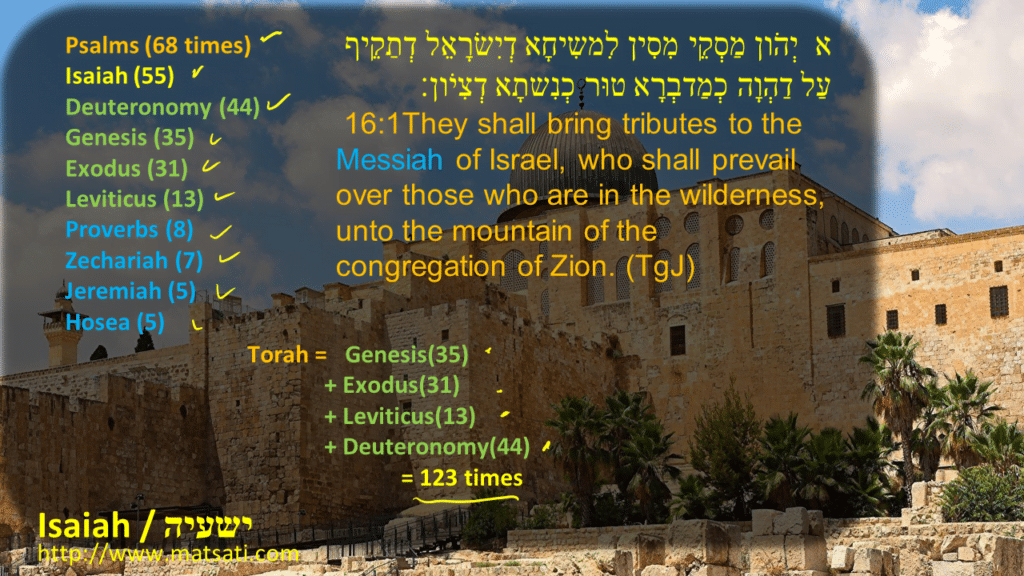
- Psalms (68 times)
- Isaiah (55)
- Deuteronomy (44)
- Genesis (35)
- Exodus (31)
- Leviticus (13)
- Proverbs (8)
- Zechariah (7)
- Jeremiah (5)
- Hosea (5)
We note that the book of Tehillim / Psalms has the top number of citations at 68 times in the NT. Isaiah is next at 55 times, and this is exactly what we suspected to find. Notice something however, the Torah is quoted in Genesis (35) + Exodus(31) + Leviticus(13) + Deuteronomy(44) = 123 times. How much more should we be studying the Torah to understand the NT text? Perhaps this should be a wakeup call to take more time to study the Tanakh (OT) because the large number of references reveal to us that there is something the NT authors wanted to draw our attention to in regards to the Messiah of God! Especially from the context of understanding who He is and what He has done and why!
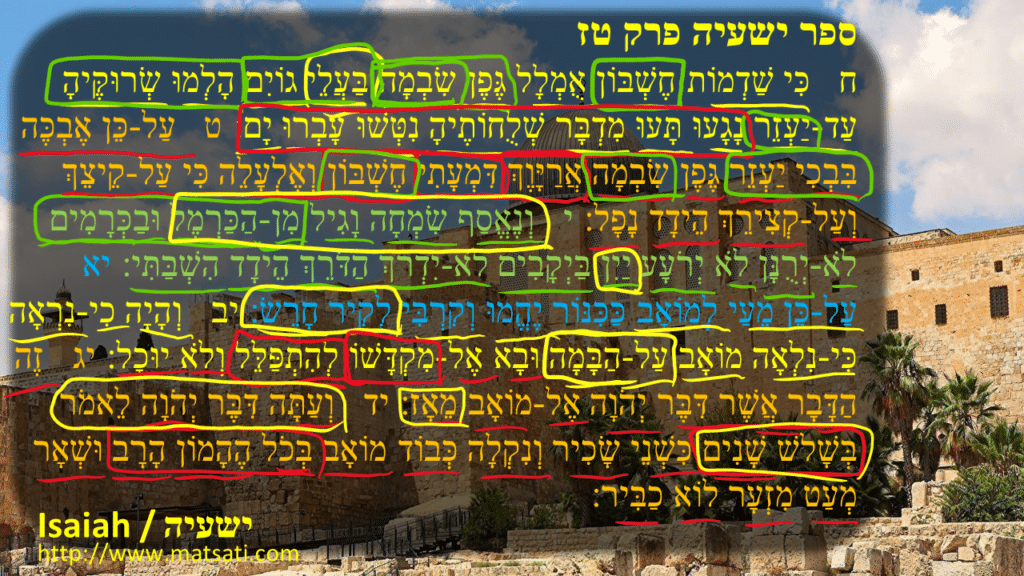
ספר ישעיה פרק טז
ח כִּי שַׁדְמוֹת חֶשְׁבּוֹן אֻמְלָל גֶּפֶן שִֹבְמָה בַּעֲלֵי גוֹיִם הָלְמוּ שְֹרוּקֶּיהָ עַד-יַעְזֵר נָגָעוּ תָּעוּ מִדְבָּר שְׁלֻחוֹתֶיהָ נִטְּשׁוּ עָבְרוּ יָם:
Isaiah 16:8 states, “For the fields of Heshbon languish, and the vine of Sibmah: (כִּי שַׁדְמוֹת חֶשְׁבּוֹן אֻמְלָל גֶּפֶן שִֹבְמָה) the lords of the heathen have broken down the principal plants thereof, they are come even unto Jazer, (בַּעֲלֵי גוֹיִם הָלְמוּ שְֹרוּקֶּיהָ עַד-יַעְזֵר) they wandered through the wilderness: her branches are stretched out, they are gone over the sea. (נָגָעוּ תָּעוּ מִדְבָּר שְׁלֻחוֹתֶיהָ נִטְּשׁוּ עָבְרוּ יָם)” A number of places are mentioned here in Isaiah 16:8.
- HESHBON (Hebrew הֶשְׁבּוֹן, heshbon; Greek Εσβους, Esbous) This is a city of Moab mentioned 38 times in the Old Testament. Heshbon was located along the King’s Highway. The first reference to Heshbon describes it as the capital city of Sihon, king of the Amorites-the first king defeated by the Israelites in the Transjordan region (Bamidbar / Numbers 21:21-26). The text indicates that Heshbon had only recently been captured by Sihon, who had deposed the “former king of Moab and taken all his land” (Bamidbar / Numbers 21:26). After the Israelites defeated Sihon, they inhabited Heshbon and the surrounding area (Bamidbar / Numbers 21:25). Later, Sihon’s territory is divided between the tribes of Reuben and Gad, with Heshbon apparently assigned to Reuben (Joshua 13:15–17, 13:24–27). Several prophets refer to Heshbon within oracles against Moab like we find here in Isaiah 15:4 and 16:8-9. (see also Jeremiah 48:2, 48:34, 48:45) It also is mentioned in an oracle against Ammon (Jeremiah 49:3) which suggests that the Ammonites seized control of Heshbon from the Moabites sometime during The three hundred and fifty years of the Iron II period (Between 900 and 750 BCE).
- SIBMAH (שִׂבְמָה, sivmah; שְׂבָם, sevam) A town in Moab rebuilt and occupied by the tribe of Reuben. It is named along with Heshbon, Elealeh and Nebo (Bamidbar / Numbers 32:3). While spelled “Sebam” in the Masoretic Text of Bamidbar / Numbers 32:3, it is probably the same place as the Sibmah mentioned in Bamidbar / Numbers 32:38 and Joshua 13:19. In the time of Isaiah and Jeremiah it was a Moabite town, but it is unknown when it was taken from Israel. It was famous for its vineyards (Isaiah 16:8; Jeremiah 48:32). According to Jerome (Commentary on Isaiah, 5) it was about 500 paces from Heshbon.
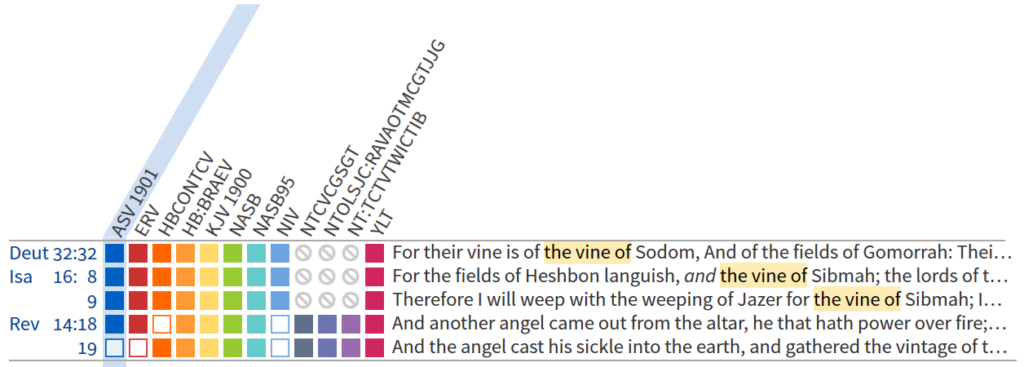
We perform a search on “the vine of” in the nasb, niv, kjv bibles and this produces a number of results. The interesting result is that of Devarim / Deuteronomy 32:32 which speaks of the vine of Sodom, which conjures up the imagery of the sins of Sodom and destruction, which parallels what we see taking place according to Isaiah 16:1-14. The idea here is of the people being utterly corrupt, bringing forth bitter and corrupted fruit. This is consistent with the statement, בַּעֲלֵי גוֹיִם הָלְמוּ שְֹרוּקֶּיהָ “the lords of the heathen have broken down the principal plants thereof…”
Isaiah 16:8 goes on saying, נָגָעוּ תָּעוּ מִדְבָּר שְׁלֻחוֹתֶיהָ נִטְּשׁוּ עָבְרוּ יָם “they wandered through the wilderness: her branches are stretched out, they are gone over the sea.” This is a reference again to Moab reaching out to Judah, drawing us back to the messianic expectation of deliverance from their troubles.
ספר ישעיה פרק טז
ט עַל-כֵּן אֶבְכֶּה בִּבְכִי יַעְזֵר גֶּפֶן שִֹבְמָה אֲרַיָּוֶךְ דִּמְעָתִי חֶשְׁבּוֹן וְאֶלְעָלֵה כִּי עַל-קֵיצֵךְ וְעַל-קְצִירֵךְ הֵידָד נָפָל:
Isaiah 16:9 states, “Therefore I will bewail with the weeping of Jazer the vine of Sibmah: (עַל-כֵּן אֶבְכֶּה בִּבְכִי יַעְזֵר גֶּפֶן שִֹבְמָה) I will water thee with my tears, O Heshbon, and Elealeh: (אֲרַיָּוֶךְ דִּמְעָתִי חֶשְׁבּוֹן וְאֶלְעָלֵה) for the shouting for thy summer fruits and for thy harvest is fallen. (כִּי עַל-קֵיצֵךְ וְעַל-קְצִירֵךְ הֵידָד נָפָל)” Note again that Sibma is named along with Heshbon, Elealeh and Nebo (Bamidbar / Numbers 32:3) due to the close proximity of these towns to one another. The בִּבְכִי יַעְזֵר “weeping of Jazer’‘ reminds us of the souls that are lost to destruction, and this causes Isaiah to write about those who are feeling, that the people of Sibmah will join with Jazer in their mourning. This suggests that Isaiah may be weeping too, just as Jeremiah wept over the people and what God had shown him will come to pass, the utter destruction and loss of life which was unnecessary if they would only repent. We note how the Lord inspires men to have a tender heart towards others, this being led by the Spirit to weep on behalf of the people shows the tenderness of Isaiah’s heart towards Moab, and we also remember this verse from the contemporary prophet Hosea.
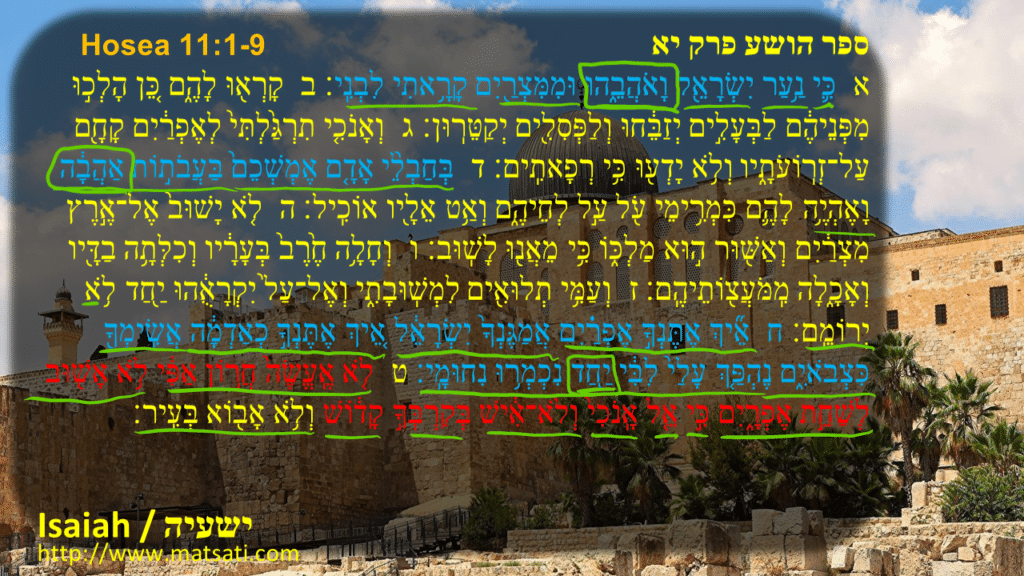
ספר הושע פרק יא
א כִּ֛י נַ֥עַר יִשְׂרָאֵ֖ל וָאֹהֲבֵ֑הוּ וּמִמִּצְרַ֖יִם קָרָ֥אתִי לִבְנִֽי׃ ב קָרְא֖וּ לָהֶ֑ם כֵּ֚ן הָלְכ֣וּ מִפְּנֵיהֶ֔ם לַבְּעָלִ֣ים יְזַבֵּ֔חוּ וְלַפְּסִלִ֖ים יְקַטֵּרֽוּן׃ ג וְאָנֹכִ֤י תִרְגַּ֙לְתִּי֙ לְאֶפְרַ֔יִם קָחָ֖ם עַל־זְרֽוֹעֹתָ֑יו וְלֹ֥א יָדְע֖וּ כִּ֥י רְפָאתִֽים׃ ד בְּחַבְלֵ֨י אָדָ֤ם אֶמְשְׁכֵם֙ בַּעֲבֹת֣וֹת אַהֲבָ֔ה וָאֶהְיֶ֥ה לָהֶ֛ם כִּמְרִ֥ימֵי עֹ֖ל עַ֣ל לְחֵיהֶ֑ם וְאַ֥ט אֵלָ֖יו אוֹכִֽיל׃ ה לֹ֤א יָשׁוּב֙ אֶל־אֶ֣רֶץ מִצְרַ֔יִם וְאַשּׁ֖וּר ה֣וּא מַלְכּ֑וֹ כִּ֥י מֵאֲנ֖וּ לָשֽׁוּב׃ ו וְחָלָ֥ה חֶ֙רֶב֙ בְּעָרָ֔יו וְכִלְּתָ֥ה בַדָּ֖יו וְאָכָ֑לָה מִֽמֹּעֲצ֖וֹתֵיהֶֽם׃ ז וְעַמִּ֥י תְלוּאִ֖ים לִמְשֽׁוּבָתִ֑י וְאֶל־עַל֙ יִקְרָאֻ֔הוּ יַ֖חַד לֹ֥א יְרוֹמֵֽם׃ ח אֵ֞יךְ אֶתֶּנְךָ֣ אֶפְרַ֗יִם אֲמַגֶּנְךָ֙ יִשְׂרָאֵ֔ל אֵ֚יךְ אֶתֶּנְךָ֣ כְאַדְמָ֔ה אֲשִֽׂימְךָ֖ כִּצְבֹאיִ֑ם נֶהְפַּ֤ךְ עָלַי֙ לִבִּ֔י יַ֖חַד נִכְמְר֥וּ נִחוּמָֽי׃ ט לֹ֤א אֶֽעֱשֶׂה֙ חֲר֣וֹן אַפִּ֔י לֹ֥א אָשׁ֖וּב לְשַׁחֵ֣ת אֶפְרָ֑יִם כִּ֣י אֵ֤ל אָֽנֹכִי֙ וְלֹא־אִ֔ישׁ בְּקִרְבְּךָ֣ קָד֔וֹשׁ וְלֹ֥א אָב֖וֹא בְּעִֽיר׃
Hosea 11:1-9
11:1 When Israel was a child, then I loved him, and called my son out of Egypt. 11:2 As they called them, so they went from them: they sacrificed unto Baalim, and burned incense to graven images. 11:3 I taught Ephraim also to go, taking them by their arms; but they knew not that I healed them. 11:4 I drew them with cords of a man, with bands of love: and I was to them as they that take off the yoke on their jaws, and I laid meat unto them. 11:5 He shall not return into the land of Egypt, and the Assyrian shall be his king, because they refused to return. 11:6 And the sword shall abide on his cities, and shall consume his branches, and devour them, because of their own counsels. 11:7 And my people are bent to backsliding from me: though they called them to the most High, none at all would exalt him. 11:8 How shall I give thee up, Ephraim? how shall I deliver thee, Israel? how shall I make thee as Admah? how shall I set thee as Zeboim? mine heart is turned within me, my repentings are kindled together. 11:9 I will not execute the fierceness of mine anger, I will not return to destroy Ephraim: for I am God, and not man; the Holy One in the midst of thee: and I will not enter into the city. (KJV)
Hosea reveals to us how the Lord God Almighty, our Father in heaven, the God of Israel has a personality, He cares for us, even for them who are perishing who do not know Him (Moab). These things reveal to us how merciful is the God in heaven, and again leads to our understanding why the Lord delivers people in His Messiah!
ספר ישעיה פרק טז
י וְנֶאֱסַף שִֹמְחָה וָגִיל מִן-הַכַּרְמֶל וּבַכְּרָמִים לֹא-יְרֻנָּן לֹא יְרֹעָע יַיִן בַּיְקָבִים לֹא-יִדְרֹךְ הַדֹּרֵךְ הֵידָד הִשְׁבַּתִּי:
Isaiah 16:10 states, “And gladness is taken away, and joy out of the plentiful field; (וְנֶאֱסַף שִֹמְחָה וָגִיל מִן-הַכַּרְמֶל) and in the vineyards there shall be no singing, neither shall there be shouting: (וּבַכְּרָמִים לֹא-יְרֻנָּן לֹא יְרֹעָע) the treaders shall tread out no wine in their presses; I have made their vintage shouting to cease. (יַיִן בַּיְקָבִים לֹא-יִדְרֹךְ הַדֹּרֵךְ הֵידָד הִשְׁבַּתִּי)” Wine (יַיִן) has much usage in all of the Scriptures. Wine has been used in figurative language as sexual immorality, as wrath, as God’s fury, as a way to distribute wrath, and even to be mixed to provide wisdom as we read in Mishley / Proverbs. Wine has been used also in the Passover meal. The produce of the vineyard was viewed by ancient peoples as a special gift from their deities (Ancient Near Eastern Texts, ed. J. B. Pritchard, 48, 214). Wine is simply the product of fermented fruit (Hosea 4:11, Joel 1:5), and thus there are many fruit beverages that may be manufactured as wine. In Hebrew the word for wine is יַיִן yayin and in Greek it is oɩ́nos. The origins of wine production are to be dated to the Neolithic period in the upper Mediterranean basin. The earliest wine-treading installations discovered in Israel date to the Chalcolithic period (4000–3500 B.C.). The Levant was known for its abundance of wine during the Middle Bronze Age, where according to the annals of Sinuhe, “Figs were in it, and grapes. It had more wine than water” (Ancient Near Eastern Texts, ed. J. B. Pritchard, 19). Wine was traded by Solomon along with wheat, barley, and olive oil in securing lumber and other products and services for building the Jerusalem temple. (2 Chronicles 2:8-10) Generally speaking, wine was processed from the vineyards in late summer and early fall as the grapes ripened which provides us for a timeframe for the occurrence of this military invasion. Wine production took place in eight stages: (1) producing a freshly crushed fruit juice, (2) treading the grapes by foot in hewn stone vats, (3) pressing the remaining grape skins and stalks, (4) straining the freshly crushed fruit juice, (5) adding water to the pressed skins to make inferior wine, (6) producing concentrated fruit juice through boiling, (7) first fermentation, (8) second fermentation.
Since the wine making process did not occur until after the harvest time, this means that the war will take place some time in the summer months such that the people will not have time to harvest or make the wine. We note that this is a time of celebration, the harvesting of grapes, as Isaiah writes what is going to happen saying, “And gladness is taken away, and joy out of the plentiful field; (וְנֶאֱסַף שִֹמְחָה וָגִיל מִן-הַכַּרְמֶל) and in the vineyards there shall be no singing, neither shall there be shouting: (וּבַכְּרָמִים לֹא-יְרֻנָּן לֹא יְרֹעָע) the treaders shall tread out no wine in their presses; I have made their vintage shouting to cease. (יַיִן בַּיְקָבִים לֹא-יִדְרֹךְ הַדֹּרֵךְ הֵידָד הִשְׁבַּתִּי)” The former joy will cease because of their unrepentant sin.
ספר ישעיה פרק טז
יא עַל-כֵּן מֵעַי לְמוֹאָב כַּכִּנּוֹר יֶהֱמוּ וְקִרְבִּי לְקִיר חָרֶשֹ:
Isaiah 16:11 states, “Wherefore my bowels shall sound like an harp for Moab, (עַל-כֵּן מֵעַי לְמוֹאָב כַּכִּנּוֹר) and mine inward parts for Kirharesh. (יֶהֱמוּ וְקִרְבִּי לְקִיר חָרֶשֹ)” Isaiah describes how his lamentation comes from deep within, to the place where his body digests and processes the nutrients for food.
- KIR-HARESETH (קִיר חֲרֶשֶׂת A capital of ancient Moab identified with modern Kerak (M.R. 217066), located ca. 17 miles S of the Arnon and 11 miles E of the Dead Sea. Strategically located on a promontory that overlooks the Dead Sea, Kerak sits astride a major intersection of the King’s Highway and the E–W road across the plateau. This position has witnessed many important events in the region’s history, in the days of Mesha (2 Kings 3:25–27), during the Crusades, and into the present. Kir-hareseth is mentioned in Isaiah 16:7, and Kir-heres, an alternate name, appears in the oracles of Isaiah 16:11 and Jeremiah 48:31, 48:36. KIR, according to Isaiah 15:1, is probably the same town.
The ancient conceptualization of the abdominal area as a seat of emotions is quite common in the Scriptures. (Isaiah 63:15, Song of Solomon. 5:4, Jeremiah 31:20, Lamentations 1:20, 2:11 as the liver, Philemon 1:8, and Colossians 3:12) These things continually remind us of musar or character building we should have the kind of character we should have a continual humble and repentant attitude towards our lives, and our God, the God of Israel!
ספר ישעיה פרק טז
יב וְהָיָה כִי-נִרְאָה כִּי-נִלְאָה מוֹאָב עַל-הַבָּמָה וּבָא אֶל-מִקְדָּשׁוֹ לְהִתְפַּלֵּל וְלֹא יוּכָל:
Isaiah 16:12 states, “And it shall come to pass, when it is seen that Moab is weary on the high place, (וְהָיָה כִי-נִרְאָה כִּי-נִלְאָה מוֹאָב עַל-הַבָּמָה) that he shall come to his sanctuary to pray; but he shall not prevail. (וּבָא אֶל-מִקְדָּשׁוֹ לְהִתְפַּלֵּל וְלֹא יוּכָל)” We note that here in the Isaiah text we read about the הַבָּמָה the high place. We had discussed earlier how this was likely the location for the pagan places of worship; they were certainly the places for Baal and Ashtoreth worship. Note how this is consistent with what we read according to Isaiah 15:2 which states the following:
ספר ישעיה פרק טו
ב עָלָ֨ה הַבַּ֧יִת וְדִיבֹ֛ן הַבָּמ֖וֹת לְבֶ֑כִי עַל־נְב֞וֹ וְעַ֤ל מֵֽידְבָא֙ מוֹאָ֣ב יְיֵלִ֔יל בְּכָל־רֹאשָׁ֣יו קָרְחָ֔ה כָּל־זָקָ֖ן גְּרוּעָֽה׃
Search of these two variations on הַבָּמ֖וֹת and הַבָּמָה “the high place” produce a number of scriptures (1 Samuel 9:14, 9:19, 10:13, 1 Kings 3:4, 12:32, 13:2, 13:32, 22:44; 2 Kings 12:4, 14:4, 15:4, 15:35, 17:29, 17:32, 18:4, 21:3, 23:8, 23:9, 23:13, 23:15, 23:15, 23:15, 23:19, 23:20, Isaiah 15:2, 16:12, Ezekiel 20:29, 2 Chronicles 14:4, 17:6, 20:33, 31:1, 33:3, 34:3). Note here the words עָלָ֨ה הַבַּ֧יִת וְדִיבֹ֛ן הַבָּמ֖וֹת לְבֶ֑כִי roughly translated “ascend to the house of divon the high place crying.” The house was likely the place of worship which Isaiah is speaking of here in that the people will be in the high place praying but to no avail, the reason being that their god is a false god, a demon who has no power to help them! Remember that Moab’s god is Chemosh, the deity that requires the sacrifice of their children. As they perform their rituals, they kill their offspring, and to what avail? Heart ache, and utter evil in the disregard of the sacredness of life itself! This is why Moab is destroyed, they have nothing to rely upon, their god is helpless. This is why Isaiah cries out to Judah that their trust should be in the Lord God in heaven and not in Moab and their abominations.
ספר ישעיה פרק טז
יג זֶה הַדָּבָר אֲשֶׁר דִּבֶּר יְהֹוָה אֶל-מוֹאָב מֵאָז: יד וְעַתָּה דִּבֶּר יְהֹוָה לֵאמֹר בְּשָׁלשׁ שָׁנִים כִּשְׁנֵי שָֹכִיר וְנִקְלָה כְּבוֹד מוֹאָב בְּכֹל הֶהָמוֹן הָרָב וּשְׁאָר מְעַט מִזְעָר לוֹא כַבִּיר:
Isaiah 16:13 states, “This is the word that the LORD hath spoken concerning Moab since that time. (זֶה הַדָּבָר אֲשֶׁר דִּבֶּר יְהֹוָה אֶל-מוֹאָב מֵאָז)” Isaiah 16:14 “But now the LORD hath spoken, saying, (וְעַתָּה דִּבֶּר יְהֹוָה לֵאמֹר) Within three years, as the years of an hireling, and the glory of Moab shall be contemned, (בְּשָׁלשׁ שָׁנִים כִּשְׁנֵי שָֹכִיר וְנִקְלָה כְּבוֹד מוֹאָב) with all that great multitude; and the remnant shall be very small and feeble. (בְּכֹל הֶהָמוֹן הָרָב וּשְׁאָר מְעַט מִזְעָר לוֹא כַבִּיר)” Here Isaiah provides a timeframe for the destruction of Moab וְעַתָּה דִּבֶּר יְהֹוָה לֵאמֹר בְּשָׁלשׁ שָׁנִים “but now the word of the Lord says in three years.” We look at the frequency of the use of the word מֵאָז (mēʾāz) in the Tanakh we learn that this can refer to a time in the future or a time in the past, and can refer to either being a long time or a short time until something happens.
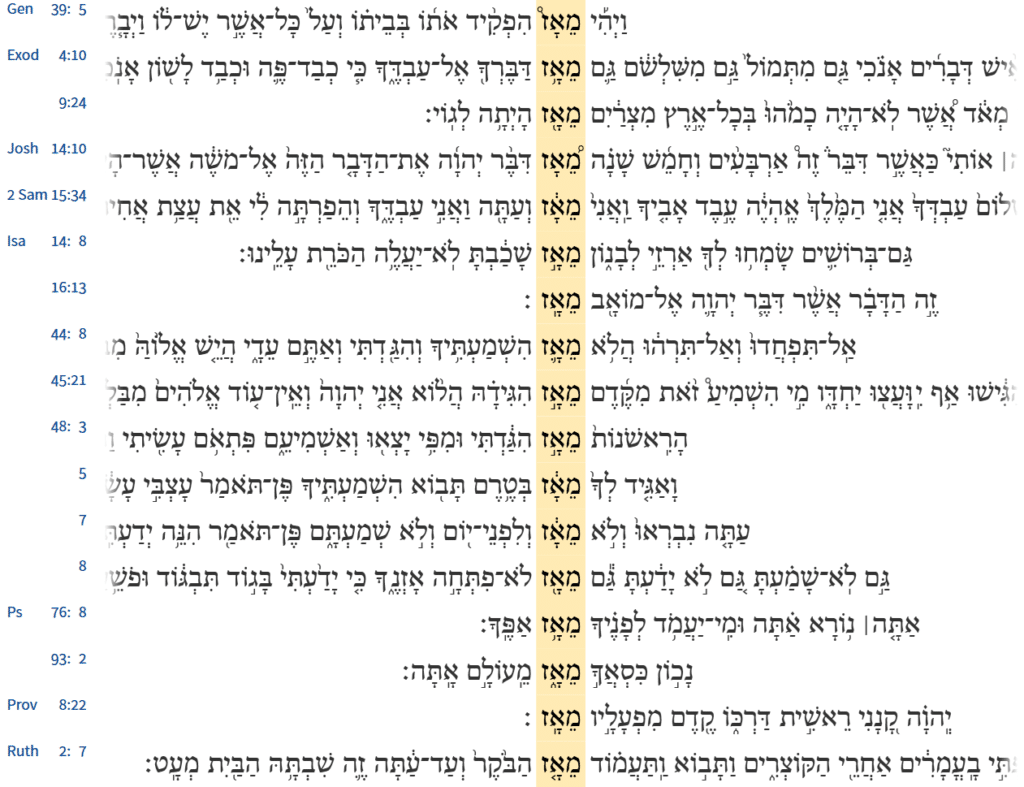
Because of the accuracy of the prediction, commentators, even John Oswalt writes that this oracle is so precise that “this material on Moab could have been derived from sources considerably older than Isaiah and compiled by him for this purpose, or they could be words spoken by him a few months or years prior to this indication of their significance by the Spirit.” Doesn’t this produce some sort of lack of faith in the power of God to predict what is going to happen in its intended time which is orchestrated by God Himself? The reason scholars take hold of this is due to there being no historical evidence for the fulfillment of this prophecy. The belief is that this had to have been fulfilled since “the Jewish community permitted its inclusion here.” Again this follows that John Oswalt is in agreement with the book of Isaiah being a redacted text. This flies in the face of the idea of Isaiah being a text inspired by God! The phrase וְנִקְלָה כְּבוֹד מוֹאָב בְּכֹל הֶהָמוֹן הָרָב וּשְׁאָר מְעַט מִזְעָר לוֹא כַבִּיר “contemptuous is the glory of Moab, in all the great builtitude of people, and the remnant small and not mighty” ends Isaiah 16:1-14 drawing this section to be consistent with the overarching theme of Isaiah, that pride will fall, because only to God is the glory, the honor, and the praise, forever and ever, amen! These things relate back to the issues of scholars who reach into academia and fall short in their faith, believing that the scriptures were written only for the time or the people in which God’s word went to. When we study the NT text, we read Paul writing in 1 Corinthians 10 that all of Scripture was written for our edification, so that we can learn what not to do, and how to live our lives before a holy and righteous God. All of Scripture has application to our lives regardless of the time and to whom it was written. When we begin to claim that a certain scripture was written only for a certain time and for a certain people, this begins to etch away at our faith and lead to a lack of faith, and even worse, hindering the faith of others! Taking this approach, that the scriptures were only written for certain people, will lead to restraining a wonderful work of God in one’s life that is based in faith. I have seen this happen over the years in many churches, even to believe that the power of God is not present today to heal, speak in tongues, etc or even to direct our ways in this world as Solomon wrote in Mishley / Proverbs 3:6 “In all your ways acknowledge him, and he will make your paths straight.” Over 30 years ago I spoke with a pastor that said he does not believe God does this today, it was only for the people of that time. It is important to note how from this perspective, one can utterly shut down the work of the Spirit in one’s life!
Rabbinic Commentary
The Targum Jonathan is an Aramaic and Rabbinic translation of the book of Isaiah and is a valuable resource for the study of the book of Isaiah.
תרגום יונתן בן עוזיאל אל ישעיה פרק טז:ח-יד
ח אְרֵי אִתבְזִיזָא מַשרְיָת חַשבֹון אִתקְטָלָא סִיעַת שִבמָה מַלכֵי עַמְמַיָא קַטִילוּ שִלטֹונֵיהֹון עַד יַעזֵר מְטֹו טְעֹו לְמַדבְרָא מְטֻלטְלֵיהֹון גַזוּ עְבַרוּ יַמָא׃ ט בְכֵין כְמָא דְאֵיתִיתִי מַשרְיָן עַל יַעזֵר כֵן אַיתִי קָטֹולִין עַל סִבמָה אְרַוֵינִיך דִמעְתָא חַשבֹון וְאַלעָלֵה אְרֵי עַל חְצָדִיך וְעַל קְטָפִיך׃ י וְיִתכְנֵיש בְיָע וְחַדוָא מִן כַרמְלָא וּבכַרמַיָא לָא יְדוּצוּן וְלָא יְחָיְכוּן חְמַר בְמַעצְרַיָא לָא יִעצֵרוּן עִיצוּרִין עִיצוּר אַבטְלֵית׃ יא עַל כֵין מְעֵיהֹון דְמֹואְבָאֵי כְכִינָרָא הָמַן וְלִיבְהֹון עַל אְנָש כְרָך תוּקפְהֹון דָווַן׃ יב וִיהֵי אְרֵי יַהלֵי אְרֵי יִלאֵי מֹואָב עַל בָמָתָא וְייֵעֹול לְבֵית טָעוּתֵיה לְמִבעֵי וְלָא יִכֹול׃ יג דֵין פִתגָמָא דְמַלֵיל יוי עַל מֹואָב מִבְכֵין׃ יד וּכעַן גְזַר יוי לְמֵימַר בִתלָת שְנִין כִשנֵי אְגִירָא וִיסוּף יְקָרְהֹון דְמֹואְבָאֵי בְכָל הְמֹון סוּגיָא וּשאָר צִיב חַד כִזעֵיר יְסוּף כָל יְקָרְהֹון׃
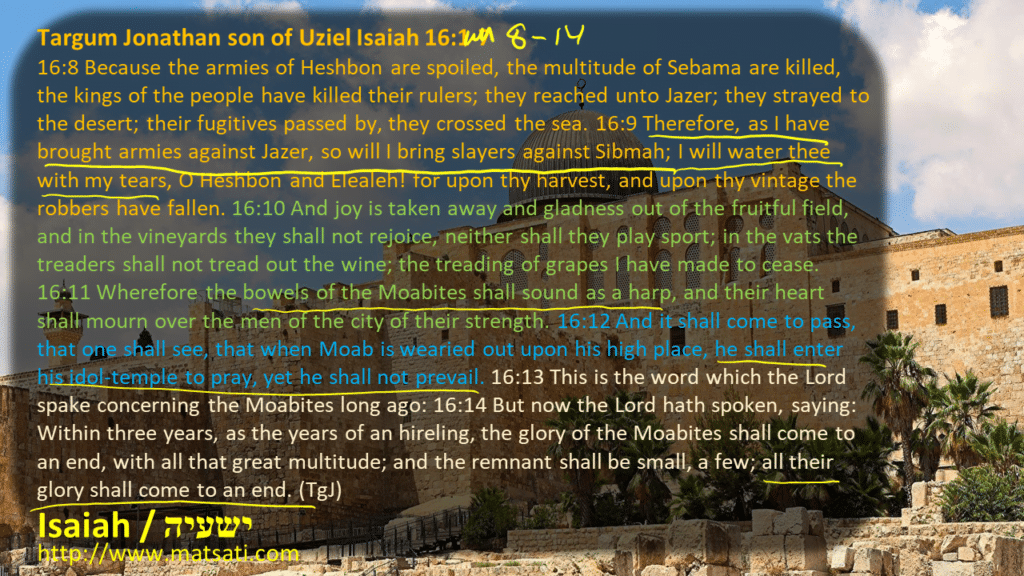
Targum Jonathan son of Uziel Isaiah 16:8-14
16:8 Because the armies of Heshbon are spoiled, the multitude of Sebama are killed, the kings of the people have killed their rulers; they reached unto Jazer; they strayed to the desert; their fugitives passed by, they crossed the sea. 16:9 Therefore, as I have brought armies against Jazer, so will I bring slayers against Sibmah; I will water thee with my tears, O Heshbon and Elealeh! for upon thy harvest, and upon thy vintage the robbers have fallen. 16:10 And joy is taken away and gladness out of the fruitful field, and in the vineyards they shall not rejoice, neither shall they play sport; in the vats the treaders shall not tread out the wine; the treading of grapes I have made to cease. 16:11 Wherefore the bowels of the Moabites shall sound as a harp, and their heart shall mourn over the men of the city of their strength. 16:12 And it shall come to pass, that one shall see, that when Moab is wearied out upon his high place, he shall enter his idol-temple to pray, yet he shall not prevail. 16:13 This is the word which the Lord spake concerning the Moabites long ago: 16:14 But now the Lord hath spoken, saying: Within three years, as the years of an hireling, the glory of the Moabites shall come to an end, with all that great multitude; and the remnant shall be small, a few; all their glory shall come to an end. (TgJ)
Based upon the TgJ translation, we read in Isaiah 16:9 that it is the Lord God Almighty who brings the armies and that it is the Lord God Almighty who will cry over the destruction of the people. Weeping, or crying, is the human response to overwhelming emotions, both good and bad. Some people cry more easily than others, but most of us have cried at times of intense sadness, profuse joy, or overwhelming relief. Since human beings are created in the בְּצֶ֥לֶם אֱלֹהִ֖ים “image of God” (Bereshit / Genesis 1:27) then it is a reasonable assumption that our Father in heaven has emotions, even to feel grieved and/or cry as we read according to the Targum. ח אְרֵי אִתבְזִיזָא מַשרְיָת חַשבֹון אִתקְטָלָא סִיעַת שִבמָה מַלכֵי עַמְמַיָא קַטִילוּ שִלטֹונֵיהֹון עַד יַעזֵר מְטֹו טְעֹו לְמַדבְרָא מְטֻלטְלֵיהֹון גַזוּ עְבַרוּ יַמָא׃ 16:8 Because the armies of Heshbon are spoiled, the multitude of Sebama are killed, the kings of the people have killed their rulers; they reached unto Jazer; they strayed to the desert; their fugitives passed by, they crossed the sea. ט בְכֵין כְמָא דְאֵיתִיתִי מַשרְיָן עַל יַעזֵר כֵן אַיתִי קָטֹולִין עַל סִבמָה אְרַוֵינִיך דִמעְתָא חַשבֹון וְאַלעָלֵה אְרֵי עַל חְצָדִיך וְעַל קְטָפִיך׃ 16:9 Therefore, as I have brought armies against Jazer, so will I bring slayers against Sibmah; I will water thee with my tears, O Heshbon and Elealeh! for upon thy harvest, and upon thy vintage the robbers have fallen. (TgJ) The following are some examples of the Lord God having an emotional response to what happens here on earth.
- He has sorrow when we rebel against Him (Bereshit / Genesis 6:6, Tehillim / Psalm 78:40).
- He can be provoked to anger by our defiance and rejection of Him (Isaiah 65:1-3, Jeremiah 8:19).
- He feels jealousy because of idolatry and worldliness (Shemot / Exodus 20:5, 34:14, Joshua 24:19).
- He rejoices with love over His children (Zephaniah 3:17, Isaiah 62:5).
- He hates wickedness (Tehillim / Psalm 5:5, 11:5, Mishley / Proverbs 6:16).
- He has great compassion for His creation (Tehillim / Psalm 103:8, Joel 2:13).
These things reveal to us how concerned, carrying, and loving our God is that He would weep for us even knowing what the ultimate outcome of events in our lives will be. This goes to show the compassion of God towards His people! Rashi states the following concerning this verse on Isaiah 16:9.
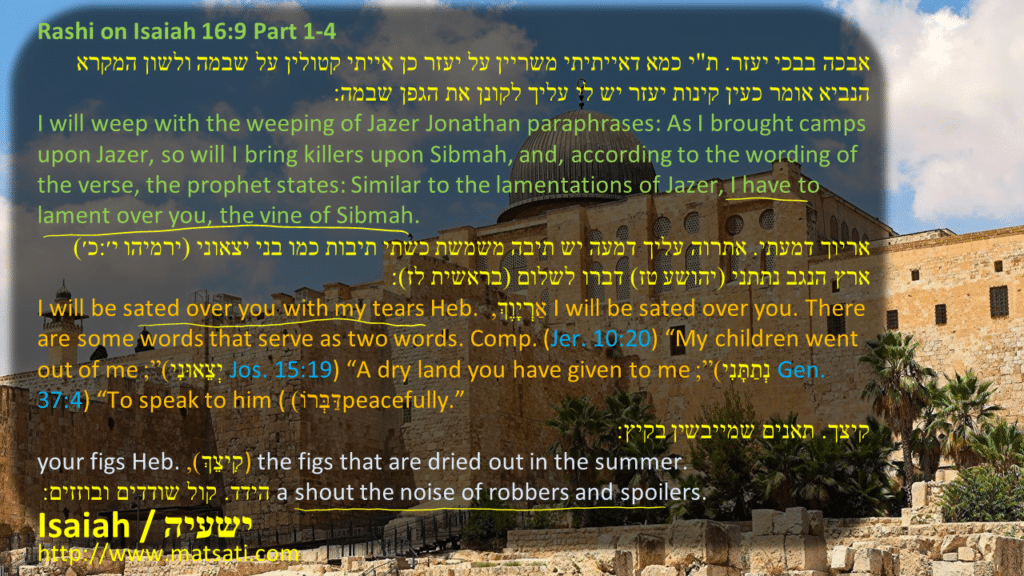
Rashi on Isaiah 16:9 Part 1-4
אבכה בבכי יעזר. ת”י כמא דאייתיתי משריין על יעזר כן אייתי קטולין על שבמה ולשון המקרא הנביא אומר כעין קינות יעזר יש לי עליך לקונן את הגפן שבמה: I will weep with the weeping of Jazer Jonathan paraphrases: As I brought camps upon Jazer, so will I bring killers upon Sibmah, and, according to the wording of the verse, the prophet states: Similar to the lamentations of Jazer, I have to lament over you, the vine of Sibmah.
אריוך דמעתי. אתרוה עליך דמעה יש תיבה משמשת כשתי תיבות כמו בני יצאוני (ירמיהו י׳:כ׳) ארץ הנגב נתתני (יהושע טז) דברו לשלום (בראשית לז): I will be sated over you with my tears Heb. אַרְיָוֶךְ, I will be sated over you. There are some words that serve as two words. Comp. (Jer. 10:20) “My children went out of me (יְצֵאוּנִי)”; (Jos. 15:19) “A dry land you have given to me (נְתַתָּנִי)”; (Gen. 37:4) “To speak to him (דַּבְּרוֹ) peacefully.”
קיצך. תאנים שמייבשין בקיץ: your figs Heb. (קִיצֵךְ), the figs that are dried out in the summer.
הידד. קול שודדים ובוזזים: a shout the noise of robbers and spoilers.
Overall, Rashi speaks of either the prophet or God weeping with those who weep. These things again speak to the compassion of God for His people. The reason this is a reference to God weeping, is because of the statement “so will I bring killers upon Sibmah” since it is not Isaiah who is bringing the killers, it is the Lord God Almighty, our Father in heaven who is doing this due to the unrepentant sin of the people. The prophet Isaiah being sent to prophecy against Moab illustrates an important point for us in God’s compassion for all peoples. In the Torah, Parashat Va’era begins with “God spoke to Moshe and said to him, “I am the Lord (YHVH). I appeared to Abraham, to Isaac, and to Jacob as El Shaddai (אל שדי), but by My name the Lord (YHVH) I did not make myself known to them.” (Shemot / Exodus 6:2-3) This reveals how the Lord has progressively revealed Himself, in greater and greater ways to His people, ultimately His name HaShem (YHVH) revealed His power to deliver the people from bondage in Egypt and from sin! It is interesting according to Isaiah 30:27 we read, הִנֵּה שֵׁם־יְהוָה֙ בָּא מִמֶּרְחָ֔ק בֹּעֵ֣ר אַפּ֔וֹ וְכֹ֖בֶד מַשּׂאָ֑ה שְׂפָתָיו֙ מָ֣לְאוּ זַ֔עַם וּלְשׁוֹנ֖וֹ כְּאֵ֥שׁ אֹכָֽלֶת׃ “Behold, the name of the LORD comes from a remote place; His anger is burning and dense with smoke; His lips are filled with indignation, And His tongue is like a consuming fire.” What is interesting about this verse is that the name of the Lord comes and is personified saying He comes, His anger is burning, and His lips being filled with indignation. These things reveal to us the power of the name of God to go forth, just as the Word of the Lord goes forth, and the Spirit of the Lord goes forth, all of these things proceed from the Father who is in heaven, the Lord God Almighty. God’s attribute of mercy is revealed in His attribute of justice. Isaiah describes the physical and economic ruin of northern Moab. This includes the cities of Heshbon and Kir Hareseth (Isaiah 15:1–4), and Jazer located at the northern end of the Dead Sea. Both Sibmah and Elealeh are listed as part of the Heshbon district and were at one time part of Reuben’s allotment (Bamidbar / Numbers 32:3, 37, Joshua 13:19). The mercy of God is found in His delaying punishment and allowing for a time of repentance and to turn from our wicked ways. 2 Peter 3:9 The Lord is not slack concerning his promise, as some men count slackness; but is longsuffering to us-ward, not willing that any should perish, but that all should come to repentance. (KJV)
The TgJ continues saying, י וְיִתכְנֵיש בְיָע וְחַדוָא מִן כַרמְלָא וּבכַרמַיָא לָא יְדוּצוּן וְלָא יְחָיְכוּן חְמַר בְמַעצְרַיָא לָא יִעצֵרוּן עִיצוּרִין עִיצוּר אַבטְלֵית׃ 16:10 And joy is taken away and gladness out of the fruitful field, and in the vineyards they shall not rejoice, neither shall they play sport; in the vats the treaders shall not tread out the wine; the treading of grapes I have made to cease. יא עַל כֵין מְעֵיהֹון דְמֹואְבָאֵי כְכִינָרָא הָמַן וְלִיבְהֹון עַל אְנָש כְרָך תוּקפְהֹון דָווַן׃ 16:11 Wherefore the bowels of the Moabites shall sound as a harp, and their heart shall mourn over the men of the city of their strength. (TgJ) These verses from the Targum speak of joy being taken away. We note, according to the Tanakh, that the joy of the Lord is of a supernatural origin. In fact, this supernatural joy is present no matter what happens in our lives, even through the trials. We have this kind of joy because no man can snatch us out of God’s hand (John 10:28-29). We as the children of God have an inheritance that is eternal (Matthew 6:20, 1 Peter 1:4). Because of trials in our lives, we should ask the Lord to keep us faithful, to remain in His love, and to overcome sin. This is how and what the author of Hebrews meant when he said that our Lord Yeshua, the Lamb of God, is the author and finisher of our faith. (Hebrews 12:2) Faith is the victory that overcomes the world. We note that this joy of the Lord that is of a supernatural origin, according to Acts 16:25, the disciples were joyous with their having been beaten and the injustices that were occurring to them due to their faith and testimony of Yeshua. Remember when the disciples were arrested in Jerusalem and ordered not to talk about Yeshua (Acts 5) and they were filled with joy being counted worthy of suffering disgrace for the Name (Acts 5:41). The joy that God gives us is not just a NT thing, we note that Nehemiah told the people who repented of their sins that the joy of the Lord would be their strength (Nehemiah 8:10). Those repent and seek the Lord, trusting in Him, receive the joy of the Lord! There are many references in the NT in regards to this joy that God gives us, since repentance and seeking our Father in heaven are functions of the Holy Spirit of God in our lives. (Acts 2:46, 13:52), and the references in the Tanakh (Isaiah 24:14, 35:10, 44:23, 48:20, 51:3, 51:11, 52:9, 66:5, Jeremiah 15:16, 31:12, 33:11, Zephaniah 3:17, Zechariah 2:10) leads us to conclude that the Joy of the Lord is a distinguishing mark of the kingdom of God (Romans 14:17). Those who are part of the kingdom share in the kingdom’s delight, just as these references from the Tanakh describe. We are said to walk in the footsteps of the Messiah Yeshua, who was always joyful (Luke 7:34). He rejoiced in the will of the Father (Luke 10:21) and spoke of his joy according to John 15:11. Yeshua promised to give us joy according to John 16:24. There is joy mentioned in many parables, such as the wedding feast (Mark 2:18-20) and including Yeshua’s comments of rejoicing in the presence of the angels of God (Luke 15:10). These things highlight the significance of sin and unrepentant, as war is brought to the borders of Moab as the TgJ states “And joy is taken away and gladness out of the fruitful field, and in the vineyards they shall not rejoice, neither shall they play sport; in the vats the treaders shall not tread out the wine; the treading of grapes I have made to cease.” Midrash Rabbah Bamidbar 20:1 states the following concerning these verses.
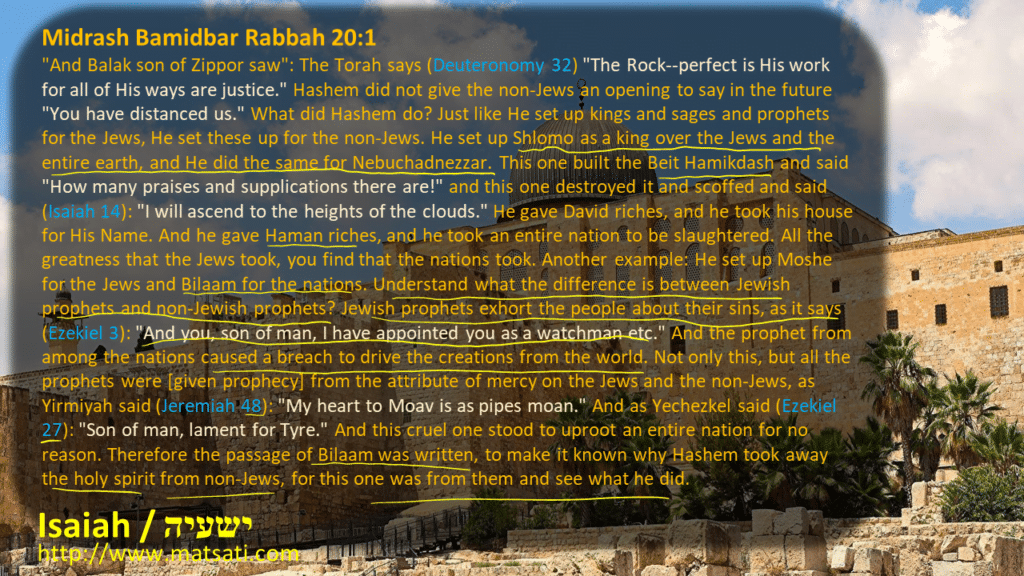
Midrash Bamidbar Rabbah 20:1
“And Balak son of Zippor saw”: The Torah says (Deuteronomy 32) “The Rock–perfect is His work for all of His ways are justice.” Hashem did not give the non-Jews an opening to say in the future “You have distanced us.” What did Hashem do? Just like He set up kings and sages and prophets for the Jews, He set these up for the non-Jews. He set up Shlomo as a king over the Jews and the entire earth, and He did the same for Nebuchadnezzar. This one built the Beit Hamikdash and said “How many praises and supplications there are!” and this one destroyed it and scoffed and said (Isaiah 14): “I will ascend to the heights of the clouds.” He gave David riches, and he took his house for His Name. And he gave Haman riches, and he took an entire nation to be slaughtered. All the greatness that the Jews took, you find that the nations took. Another example: He set up Moshe for the Jews and Bilaam for the nations. Understand what the difference is between Jewish prophets and non-Jewish prophets? Jewish prophets exhort the people about their sins, as it says (Ezekiel 3): “And you, son of man, I have appointed you as a watchman etc.” And the prophet from among the nations caused a breach to drive the creations from the world. Not only this, but all the prophets were [given prophecy] from the attribute of mercy on the Jews and the non-Jews, as Yirmiyah said (Jeremiah 48): “My heart to Moav is as pipes moan.” And as Yechezkel said (Ezekiel 27): “Son of man, lament for Tyre.” And this cruel one stood to uproot an entire nation for no reason. Therefore the passage of Bilaam was written, to make it known why Hashem took away the holy spirit from non-Jews, for this one was from them and see what he did.
The Midrash draws up a conversation asking the difference between the prophets of Israel and the prophets of the nations. The illustration used is that of the prophet Bilam who chose to drive a breach in the midst of the nations causing the non-Jew to perish from the earth (Remember Parashat Balak (Bamidbar / Numbers 22:2-25:9) and Pinchas (Bamidbar / Numbers 25:10-30:1)). The Lord however has not left the nations to fend for themselves, as He gives the prophets of Israel prophetic words for the nations, such as here in the case of the people of Moab. These things illustrate for us how the Lord calls all men to repentance and to turn to His holy and righteous ways. Midrash Tanchuma Buber Balak 1:1 states that “Just as he raised up kings, prophets, [and sages] for Israel, so did he raise them up from the nations of the world. Moreover, the kings, prophets, and sages [that belonged to Israel] were coupled with the kings, prophets, and sages that belonged to the nations of the world.” The differences are that the prophets of Israel warn the nation about transgressions, and so it says (in Ezekiel 3:17) The Midrash states that Bilam was a cruel man who rose up to uproot a whole nation without cause, for nothing. This was the reason why the parashah on Balaam was written to make known why the Holy One removed the Holy Spirit of God from the nations of the world. The reason was because of this single man who arose out of them. Nevertheless, the Lord God of Israel seeks that all men come to Him, humble themselves, repent, and turn from their evil ways, and seek the One who loves them!
Isaiah continues according to the TgJ saying, יב וִיהֵי אְרֵי יַהלֵי אְרֵי יִלאֵי מֹואָב עַל בָמָתָא וְייֵעֹול לְבֵית טָעוּתֵיה לְמִבעֵי וְלָא יִכֹול׃ 16:12 And it shall come to pass, that one shall see, that when Moab is wearied out upon his high place, he shall enter his idol-temple to pray, yet he shall not prevail. (TgJ) This connects us back to Isaiah 15:2 which states, עָלָ֨ה הַבַּ֧יִת וְדִיבֹ֛ן הַבָּמ֖וֹת לְבֶ֑כִי “ascend to the house, and Divon the high place weeping,” and to Isaiah 16:12 which states, וְהָיָה כִי-נִרְאָה כִּי-נִלְאָה מוֹאָב עַל-הַבָּמָה וּבָא אֶל-מִקְדָּשׁוֹ לְהִתְפַּלֵּל וְלֹא יוּכָל “And it shall come to pass, when it is seen that Moab is weary on the high place, that he shall come to his sanctuary to pray; but he shall not prevail.” The idea is that these high places were created as places of worship for false gods, their worship is futile, just like the psalmist states according to Tehillim / Psalms 115:4-8, 115:4 But their idols are silver and gold, made by human hands. 115:5 They have mouths, but cannot speak, eyes, but cannot see. 115:6 They have ears, but cannot hear, noses, but cannot smell. 115:7 They have hands, but cannot feel, feet, but cannot walk, nor can they utter a sound with their throats. 115:8 Those who make them will be like them, and so will all who trust in them. (NIV) So the idea is that idol worship will cause their worshipers to not be able to have understanding, nor be able to see or hear the truth. There is a modern day parallel to this in those who worship the flesh, who glorify the flesh, and who trust in the flesh (Jeremiah 17:5-10) using the COVID vaccine as the thing in which they trust, as opposed to God in heaven who created us! It does not matter how obvious this is, those who have bowed down to this system of trusting in the flesh for their strength are blind, and deaf, and have no ability to understand the truth! We note what Ibn Ezra states concerning Isaiah 16:12.
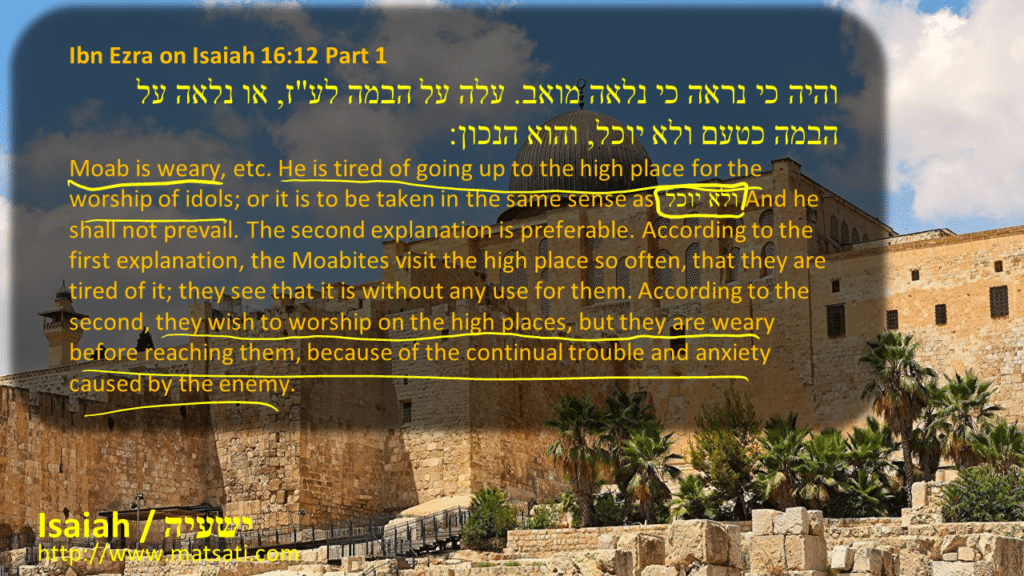
Ibn Ezra on Isaiah 16:12 Part 1
והיה כי נראה כי נלאה מואב. עלה על הבמה לע”ז, או נלאה על הבמה כטעם ולא יוכל, והוא הנכון:
Moab is weary, etc. He is tired of going up to the high place for the worship of idols; or it is to be taken in the same sense as ולא יוכל And he shall not prevail. The second explanation is preferable.25According to the first explanation, the Moabites visit the high place so often, that they are tired of it; they see that it is without any use for them. According to the second, they wish to worship on the high places, but they are weary before reaching them, because of the continual trouble and anxiety caused by the enemy.
The idea here is that the Moabites ascend each time they are in trouble to pray to their god. So they are having so many troubles that they are weary from all their ascending and descending from the high place. The interesting thing is the need for them to worship in their holy places in order for their god to hear them. Note that this was common back even in Yeshua’s day according to John 4:5-24.
John 4:5-24
4:5 Then cometh he to a city of Samaria, which is called Sychar, near to the parcel of ground that Jacob gave to his son Joseph. 4:6 Now Jacob’s well was there. Jesus therefore, being wearied with his journey, sat thus on the well: and it was about the sixth hour. 4:7 There cometh a woman of Samaria to draw water: Jesus saith unto her, Give me to drink. 4:8 (For his disciples were gone away unto the city to buy meat.) 4:9 Then saith the woman of Samaria unto him, How is it that thou, being a Jew, askest drink of me, which am a woman of Samaria? for the Jews have no dealings with the Samaritans. 4:10 Jesus answered and said unto her, If thou knewest the gift of God, and who it is that saith to thee, Give me to drink; thou wouldest have asked of him, and he would have given thee living water. 4:11 The woman saith unto him, Sir, thou hast nothing to draw with, and the well is deep: from whence then hast thou that living water? 4:12 Art thou greater than our father Jacob, which gave us the well, and drank thereof himself, and his children, and his cattle? 4:13 Jesus answered and said unto her, Whosoever drinketh of this water shall thirst again: 4:14 But whosoever drinketh of the water that I shall give him shall never thirst; but the water that I shall give him shall be in him a well of water springing up into everlasting life. 4:15 The woman saith unto him, Sir, give me this water, that I thirst not, neither come hither to draw. 4:16 Jesus saith unto her, Go, call thy husband, and come hither. 4:17 The woman answered and said, I have no husband. Jesus said unto her, Thou hast well said, I have no husband: 4:18 For thou hast had five husbands; and he whom thou now hast is not thy husband: in that saidst thou truly. 4:19 The woman saith unto him, Sir, I perceive that thou art a prophet. 4:20 Our fathers worshiped in this mountain; and ye say, that in Jerusalem is the place where men ought to worship. 4:21 Jesus saith unto her, Woman, believe me, the hour cometh, when ye shall neither in this mountain, nor yet at Jerusalem, worship the Father. 4:22 Ye worship ye know not what: we know what we worship: for salvation is of the Jews. 4:23 But the hour cometh, and now is, when the true worshippers shall worship the Father in spirit and in truth: for the Father seeketh such to worship him. 4:24 God is a Spirit: and they that worship him must worship him in spirit and in truth. (KJV, ܘܶܐܬ݂ܴܐ ܠܱܡܕ݂ܺܝܢ̄ܬܴ݁ܐ ܕ݁ܫܳܡܪܴ̈ܝܶܐ ܁ ܕ݁ܡܶܬ݂ܩܰܪܝܳܐ ܫܳܟ݂ܰܪ ܂ ܥܰܠ ܓܷ݁ܢ̄ܒ݂ ܩܪܻܝܬ݂ܴܐ ܂ ܕ݁ܝܰܗ̄ܒ݂ ܗ̄ܘܳܐ ܝܰܥܩܽܘܒ݂ ܠܝܰܘܣܶܦ݂ ܒ݁ܪܷܗ ܂ܘܺܐܝܬ݂ ܗ̄ܘܳܐ ܬܱ݁ܡܳܢ ܡܥܺܝܢܳܐ ܕ݁ܡܰܝܴ̈ܐ ܕ݁ܝܰܥܩܽܘܒ݂ ܂ ܗܽܘ ܕܷ݁ܝܢ ܝܶܫܽܘܥ ܠܐܷܐ ܗ̄ܘܳܐ ܡܶܢ ܥܰܡܠܴܐ ܕܾ݁ܐܘܪܚܳܐ ܂ ܘܺܝܬ݂ܷܒ݂ ܗ̄ܘܳܐ ܠܷܗ ܥܰܠ ܡܥܺܝܢܳܐ ܂ ܘܺܐܝܬ݂ ܗ̄ܘܰܝ̈ ܫܶܬ݂ ܫܳܥܺܝ̈ܢ ܂ ܘܶܐܬ݂ܴܬ݂ ܐܱܢ̄ܬ݁ܬ݂ܴܐ ܡܶܢ ܫܳܡܪܻܝܢ ܕ݁ܬ݂ܷܡܠܷܐ ܡܰܝܴ̈ܐ ܂ ܘܶܐܡܰܪ ܠܴܗ ܝܶܫܽܘܥ ܂ ܗܰܒ݂ ܠܻܝ ܡܰܝܴ̈ܐ ܐܷܫܬܷ݁ܐ ܂ ܬܱ݁ܠܡܺܝ̈ܕ݂ܰܘܗ̄ܝ ܓܷ݁ܝܪ ܥܰܠܘ ܗ̄ܘܰܘ ܠܱܡܕ݂ܺܝܢ̄ܬܴ݁ܐ ܂ ܕ݁ܢܶܙܒ݁ܢܽܘܢ ܠܗܽܘܢ ܣܰܝܒܴ݁ܪܬܴ݁ܐ ܂ ܐܴܡܪܴܐ ܠܷܗ ܗܳܝ ܐܱܢ̄ܬ݁ܬ݂ܴܐ ܫܳܡܪܴܝܬܴ݁ܐ ܂ ܐܱܝܟܱ݁ܢܳܐ ܐܱܢ̄ܬ݁ ܝܺܗܽܘܕ݂ܳܝܳܐ ܐܱܢ̄ܬ݁ ܇ ܘܡܶܢܝ ܫܳܐܷܠ ܐܱܢ̄ܬ݁ ܠܡܶܫܬܴ݁ܐ ܂ ܕܻ݁ܐܝܬ݂ܱܝ ܐܱܢ̄ܬ݁ܬ݂ܴܐ ܫܳܡܪܴܝܬܴ݁ܐ ܂ ܠܴܐ ܓܷ݁ܝܪ ܡܶܬ݂ܚܰܫܚܺܝܢ ܝܺܗܽܘܕ݂ܳܝܷ̈ܐ ܥܰܡ ܫܳܡܪܴ̈ܝܶܐ ܂ ܥܢܳܐ ܝܶܫܽܘܥ ܂ ܘܶܐܡܰܪ ܠܴܗ ܂ ܐܷܠܾܘ ܝܳܕ݂ܥܳܐ ܗ̄ܘܰܝܬ݁ܝ ܡܰܘܗܰܒ݂ܬܴ݁ܐ ܕܱ݁ܐܠܴܗܳܐ ܞ ܘܡܰܢܽܘ ܗܳܢܳܐ ܕܷ݁ܐܡܰܪ ܠܷܟ݂ܝ ܂ ܗܰܒ݂ ܠܻܝ ܐܷܫܬܷ݁ܐ ܆ ܐܱܢ̄ܬ݁ܝ ܫܳܐܠܴܐ ܗ̄ܘܰܝܬ݁ܝ ܠܷܗ ܂ ܘܝܳܗܶܒ݂ ܗ̄ܘܳܐ ܠܷܟ݂ܝ ܡܰܝܴ̈ܐ ܚܰܝܷ̈ܐ ܂ ܐܴܡܪܴܐ ܠܷܗ ܐܱܢ̄ܬ݁ܬ݂ܴܐ ܗܳܝ ܂ ܡܳܪܝ ܆ ܠܴܐ ܕܱ݁ܘܠܴܐ ܐܻܝܬ݂ ܠܴܟ݂ ܁ ܘܒ݂ܺܪܴܐ ܥܰܡܺܝܩܳܐ ܂ ܐܱܝܡܶܟܴ݁ܐ ܠܴܟ݂ ܡܰܝܴ̈ܐ ܚܰܝܷ̈ܐ ܂ ܠܡܳܐ ܐܱܢ̄ܬ݁ ܪܱܒ݂ ܐܱܢ̄ܬ݁ ܡܶܢ ܐܱܒ݂ܽܘܢ ܝܰܥܩܽܘܒ݂ ܞ ܗܰܘ ܕ݁ܗܽܘ ܝܰܗ̄ܒ݂ ܠܱܢ ܒܻ݁ܪܴܐ ܗܳܕ݂ܶܐ ܞ ܘܗܽܘ ܡܶܢܳܗ ܐܷܫܬܻ݁ܝ ܘܰܒ݂ܢܱ̈ܘܗ̄ܝ ܘܥܳܢܷ̈ܗ ܂ ܥܢܳܐ ܝܶܫܽܘܥ ܘܶܐܡܰܪ ܠܴܗ ܂ ܟܾ݁ܠ ܕ݁ܢܶܫܬܷ݁ܐ ܡܶܢ ܗܳܠܷܝܢ ܡܰܝܴ̈ܐ ܂ ܬܾ݁ܘܒ݂ ܢܶܨܗܶܐ ܂ ܟܾ݁ܠ ܕܷ݁ܝܢ ܕ݁ܢܶܫܬܷ݁ܐ ܡܶܢ ܡܰܝܴ̈ܐ ܕܷ݁ܐܢܳܐ ܐܷܬܷ݁ܠ ܠܷܗ ܂ ܠܴܐ ܢܶܨܗܶܐ ܠܥܳܠܱܡ ܂ ܐܷܠܴܐ ܡܰܝܴ̈ܐ ܗܳܢܽܘܢ ܕ݁ܝܳܗܶܒ݂ ܐ̱ܢܳܐ ܠܷܗ ܆ ܢܶܗܘܽܘܢ ܒܷ݁ܗ ܡܥܺܝܢܳܐ ܕ݁ܡܰܝܴ̈ܐ ܁ ܕ݁ܢܳܒ݂ܥܺܝܢ ܠܚܰܝܷ̈ܐ ܕܱ݁ܠܥܳܠܱܡ ܂ ܐܴܡܪܴܐ ܠܷܗ ܐܱܢ̄ܬ݁ܬ݂ܴܐ ܗܳܝ ܂ ܡܳܪܝ ܆ ܗܰܒ݂ ܠܻܝ ܡܶܢ ܗܳܠܷܝܢ ܡܰܝܴ̈ܐ ܂ ܕ݁ܠܴܐ ܬܾ݁ܘܒ݂ ܐܷܨܗܶܐ ܂ ܘܠܴܐ ܗܘܺܝܬ݂ ܐܴܬ݂ܝܳܐ ܕܴ݁ܠܝܳܐ ܡܶܢ ܗܳܪܟܴ݁ܐ ܂ ܐܴܡܰܪ ܠܴܗ ܝܶܫܽܘܥ ܂ ܙܶܠܝ ܩܪܴܝ ܠܒ݂ܰܥܠܷܟ݂ܝ ܂ ܘܬ݂ܴܝ ܠܗܳܪܟܴ݁ܐ ܂ ܐܴܡܪܴܐ ܠܷܗ ܂ ܠܱܝܬ݁ ܠܻܝ ܒܱ݁ܥܠܴܐ ܂ ܐܴܡܰܪ ܠܴܗ ܝܶܫܽܘܥ ܂ ܫܰܦܻ݁ܝܪ ܐܷܡܰܪܬ݁ܝ ܂ ܕ݁ܠܱܝܬ݁ ܠܻܝ ܒܱ݁ܥܠܴܐ ܂ ܚܰܡܫܳܐ ܓܷ݁ܝܪ ܒܱ݁ܥܠܻܝ̈ܢ ܗܘܰܘ ܠܷܟ݂ܝ ܂ ܘܗܳܢܳܐ ܕܻ݁ܐܝܬ݂ ܠܷܟ݂ܝ ܗܳܫܳܐ ܂ ܠܴܐ ܗܘܳܐ ܒܱ݁ܥܠܷܟ݂ܝ ܂ ܗܳܕ݂ܶܐ ܂ ܫܰܪܻܝܪܬܴ݁ܐ ܐܷܡܰܪܬ݁ܝ ܂ ܐܴܡܪܴܐ ܠܷܗ ܗܳܝ ܐܱܢ̄ܬ݁ܬ݂ܴܐ ܂ ܡܳܪܝ ܆ ܚܳܙܝܳܐ ܐ̱ܢܳܐ ܕܱ݁ܢܒ݂ܺܝܳܐ ܐܱܢ̄ܬ݁ ܂ ܐܱܒ݂ܳܗܰܝ̈ܢ ܒ݁ܗܳܢܳܐ ܛܾܘܪܴܐ ܣܓ݂ܶܕ݂ܘ ܂ ܘܰܐܢ̄ܬܾ݁ܘܢ ܐܴܡܪܻܝܢ ܐܢ̄ܬܾ݁ܘܢ ܂ ܕ݁ܒ݂ܽܐܘܪܻܫܠܷܡ ܗ̄ܽܘ ܐܱܬ݂ܱܪ ܕ݁ܘܳܠܷܐ ܠܡܶܣܓܱ݁ܕ݂ ܂ ܐܴܡܰܪ ܠܴܗ ܝܶܫܽܘܥ ܂ ܐܱܢ̄ܬ݁ܬ݂ܴܐ ܂ ܗܰܝܡܶܢܺܝܢܝ ܕܴ݁ܐܬ݂ܝܳܐ ܫܳܥܬ݂ܴܐ ܆ ܕ݁ܠܴܐ ܒ݁ܗܳܢܳܐ ܛܾܘܪܴܐ ܂ ܘܳܐܦ݂ ܠܴܐ ܒܾ݁ܐܘܪܻܫܠܷܡ ܬܷ݁ܣܓ݁ܕ݂ܽܘܢ ܠܱܐܒ݂ܳܐ ܂ ܐܱܢ̄ܬܾ݁ܘܢ ܣܳܓ݂ܕܻ݁ܝܢ ܐܢ̄ܬܾ݁ܘܢ ܂ ܠܡܶܕܷ݁ܡ ܕ݁ܠܴܐ ܝܳܕ݂ܥܺܝܢ ܐܢ̄ܬܾ݁ܘܢ ܂ ܚܢܰܢ ܕܷ݁ܝܢ ܣܳܓ݂ܕܻ݁ܝܢ ܚ̄ܢܰܢ ܂ ܠܡܳܐ ܕ݁ܝܳܕ݂ܥܺܝܢ ܚ̄ܢܰܢ ܂ ܕ݁ܚܰܝܷ̈ܐ ܡܶܢ ܝܺܗܽܘܕ݂ܳܝܷ̈ܐ ܐܷܢܽܘܢ ܂ ܐܷܠܴܐ ܐܴܬ݂ܝܳܐ ܫܳܥܬ݂ܴܐ ܁ ܘܗܳܫܳܐ ܐܻܝܬ݂ܷܝܗ ܆ ܐܷܡܰܬ݂ܝ ܕ݁ܣܳܓ݂ܾ̈ܘܕ݂ܶܐ ܫܰܪܻ̈ܝܪܷܐ ܢܶܣܓ݁ܕ݂ܽܘܢ ܠܱܐܒ݂ܳܐ ܒ݁ܪܾܘܚܳܐ ܂ ܘܒ݂ܰܫܪܴܪܴܐ ܂ ܐܴܦ݂ ܐܱܒ݂ܳܐ ܓܷ݁ܝܪ ܕܱ݁ܐܝܟ݂ ܗܳܠܷܝܢ ܗ̄ܽܘ ܣܳܓ݂ܽܘ̈ܕ݂ܶܐ ܒܴ݁ܥܶܐ ܂ ܪܾܘܚܳܐ ܗܽܘ ܓܷ݁ܝܪ ܐܱܠܴܗܳܐ ܂ ܘܰܐܝܠܷܝܢ ܕ݁ܣܳܓ݂ܕܻ݁ܝܢ ܠܷܗ ܆ ܒ݁ܪܾܘܚܳܐ ܘܒ݂ܰܫܪܴܪܴܐ ܘܳܠܷܐ ܕ݁ܢܶܣܓ݁ܕ݂ܽܘܢ ܂)
We note what the woman said to Yeshua, 4:19 The woman saith unto him, Sir, I perceive that thou art a prophet. 4:20 Our fathers worshiped in this mountain; and ye say, that in Jerusalem is the place where men ought to worship. (KJV) and so this follows from the narrative that we read of the nations in the book of Isaiah. We note how Yeshua responded saying, “Woman, believe me, the hour cometh, when ye shall neither in this mountain, nor yet at Jerusalem, worship the Father. Ye worship ye know not what: we know what we worship: for salvation is of the Jews. But the hour cometh, and now is, when the true worshippers shall worship the Father in spirit and in truth: for the Father seeketh such to worship him.” Note also how the Torah speaks in this very same language style of the place in which God establishes His name. So looking at the Hebrew Scriptures, the Torah specifically, for occurrences of the word המקום “the place” which is a specific reference to where God will establish His name we get the following results:
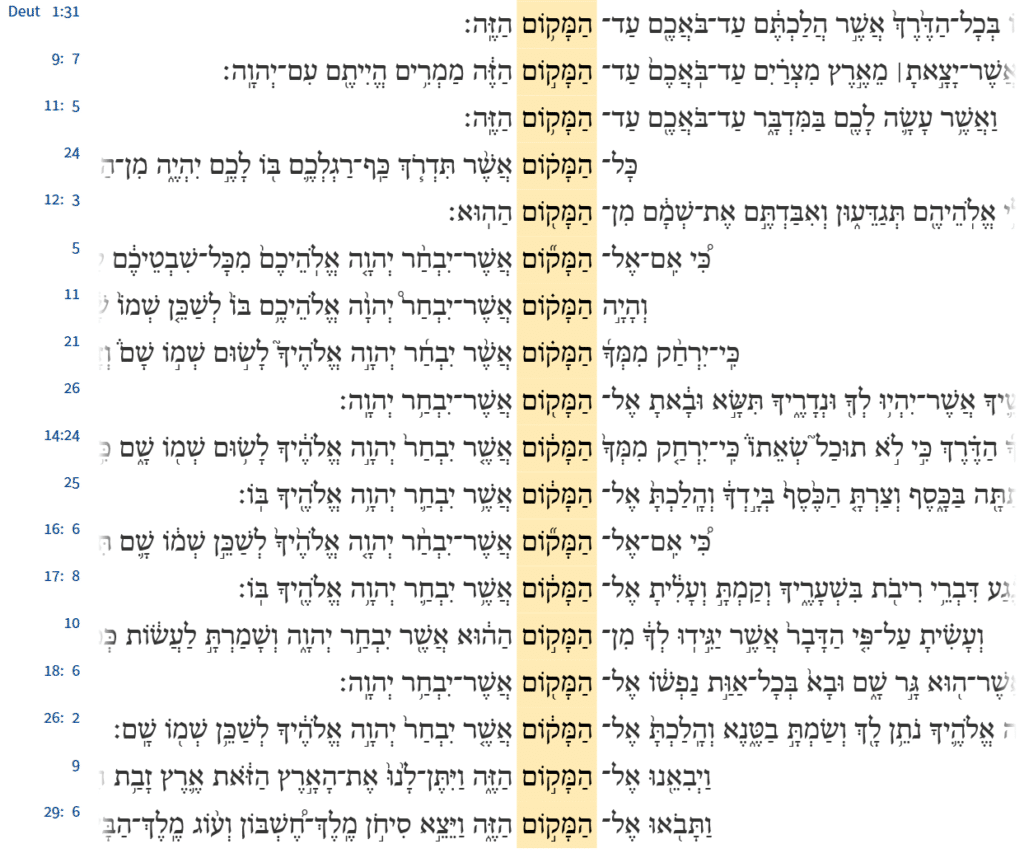
There were search results from all of the Torah, Devarim / Deuteronomy however resulted in the most results on המקום “the place” shown above. We note the book of Devarim / Deuteronomy speaks of this the most from the sense of God establishing a place for His name. The following select verses illustrate this point:
Devarim / Deuteronomy 12:5
But you shall seek the Lord at the place which the Lord your God will choose from all your tribes, to establish His name there for His dwelling, and there you shall come.
Devarim / Deuteronomy 12:11
then it shall come about that the place in which the Lord your God will choose for His name to dwell, there you shall bring all that I command you: your burnt offerings and your sacrifices, your tithes and the contribution of your hand, and all your choice votive offerings which you will vow to the Lord.
Devarim / Deuteronomy 12:21
If the place which the Lord your God chooses to put His name is too far from you, then you may slaughter of your herd and flock which the Lord has given you, as I have commanded you; and you may eat within your gates whatever you desire.
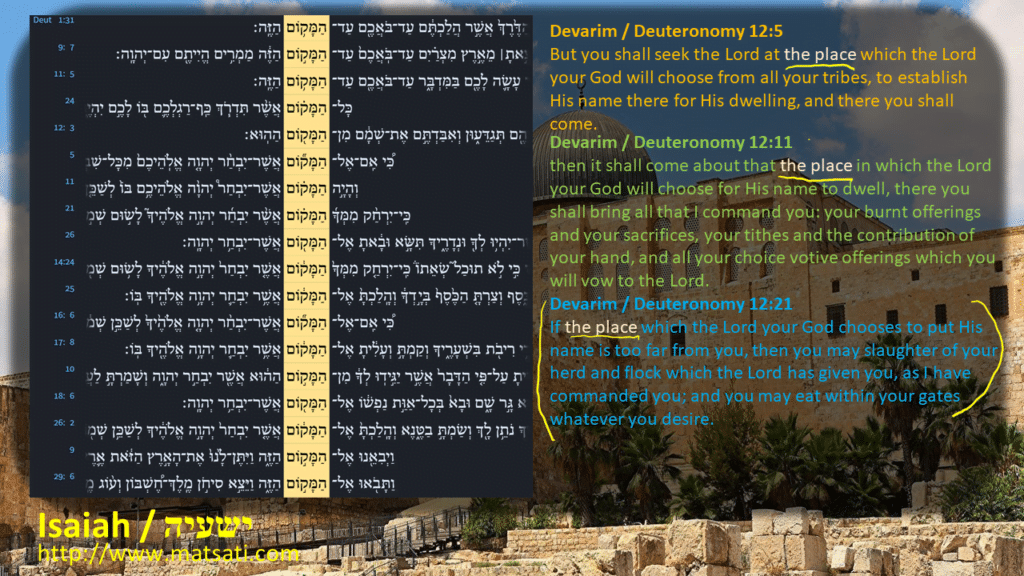
Devarim / Deuteronomy 16:2
You shall sacrifice the Passover to the Lord your God from the flock and the herd, in the place where the Lord chooses to establish His name.
Devarim / Deuteronomy 16:6
but at the place where the Lord your God chooses to establish His name, you shall sacrifice the Passover in the evening at sunset, at the time that you came out of Egypt.
Devarim / Deuteronomy 16:11
and you shall rejoice before the Lord your God, you and your son and your daughter and your male and female servants and the Levite who is in your town, and the stranger and the orphan and the widow who are in your midst, in the place where the Lord your God chooses to establish His name.
Devarim / Deuteronomy 26:2
that you shall take some of the first of all the produce of the ground which you bring in from your land that the Lord your God gives you, and you shall put it in a basket and go to the place where the Lord your God chooses to establish His name.
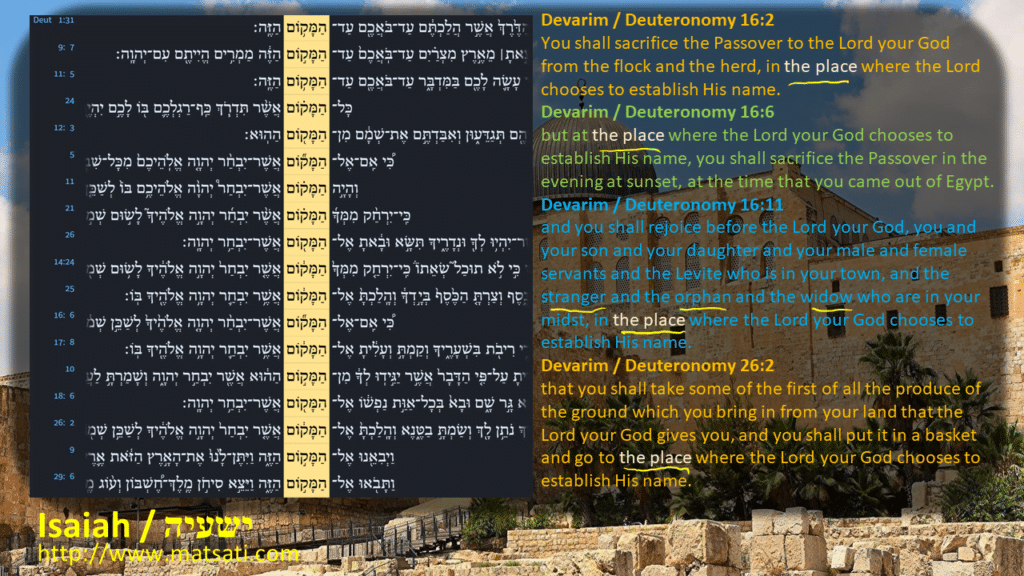
These Scriptures describe the commands to seek the Lord God in the place that he chooses, that one is to go to this place bringing offerings and sacrifices. There are comments on what happens when the place God establishes His name is too far away, and then discussion on the Passover, and the fact that we are to rejoice in the Lord our God because of who He is and what He has done, and never to forget His great Name! The moment one forgets the Lord, His mitzvot (commands) and all that He has done for us, is the point at which the falling away begins. These are the things Paul warns in 1 Timothy 4:1-3 “But the spirit explicitly says that in later times some will fall away from the faith, paying attention to deceitful spirits and doctrines of demons.” (הָרוּחַ אוֹמֶרֶת בְּפֵרוּשׁ, שֶׁבִּרְבוֹת הַיָּמִים יִסְטוּ אֲנָשִׁים מִן הָאֱמוּנָה וְיִפְנוּ לְרוּחוֹת מַטְעוֹת וּלְתוֹרוֹת שֶׁל שֵׁדִים,) The phrase here יִסְטוּ אֲנָשִׁים מִן הָאֱמוּנָה “men will deviate/stray from the truth” where this deviation will lead to וְיִפְנוּ לְרוּחוֹת מַטְעוֹת וּלְתוֹרוֹת שֶׁל שֵׁדִים “facing unclean spirits and the teachings of demons.” This happens because one turns from the life that God wants for us, a life filled with His holy words! These Scriptures, and all of Scripture, has application for our lives, and the purpose is for remembrance, such as what we read according to Jude 1:5-10.
Jude 1:5-10
1:5 I will therefore put you in remembrance, though ye once knew this, how that the Lord, having saved the people out of the land of Egypt, afterward destroyed them that believed not. 1:6 And the angels which kept not their first estate, but left their own habitation, he hath reserved in everlasting chains under darkness unto the judgment of the great day. 1:7 Even as Sodom and Gomorrha, and the cities about them in like manner, giving themselves over to fornication, and going after strange flesh, are set forth for an example, suffering the vengeance of eternal fire. 1:8 Likewise also these filthy dreamers defile the flesh, despise dominion, and speak evil of dignities. 1:9 Yet Michael the archangel, when contending with the devil he disputed about the body of Moses, durst not bring against him a railing accusation, but said, The Lord rebuke thee. 1:10 But these speak evil of those things which they know not: but what they know naturally, as brute beasts, in those things they corrupt themselves. (KJV, 5 ܠܡܰܥ̄ܗܳܕ݂ܽܘܬ݂ܟ݂ܽܘܢ ܕܷ݁ܝܢ ܨܴܒ݂ܶܐ ܐ̱ܢܳܐ ܇ ܟܱ݁ܕ݂ ܝܳܕ݂ܥܺܝܢ ܐܢ̄ܬܾ݁ܘܢ ܟܾ݁ܠܗܶܝܢ ܆ ܕܱ݁ܐܠܴܗܳܐ ܟܱ݁ܕ݂ ܚܕ݂ܳܐ ܙܒ݂ܰܢ ܠܥܰܡܳܐ ܡܶܢ ܡܶܨܪܷܝܢ ܦ݁ܪܱܩ ܆ ܗܳܝ ܕ݁ܬ݂ܱܪ̈ܬܷ݁ܝܢ ܠܱܐܝܠܷܝܢ ܕ݁ܠܴܐ ܗܰܝܡܶܢܘ ܐܱܘܒܷ݁ܕ݂ ܂ 6 ܘܰܠܡܱ̈ܠܱܐܟ݂ܶܐ ܐܱܝܠܷܝܢ ܕ݁ܠܴܐ ܢܛܱܪܘ ܪܻܝܫܳܢܽܘܬ݂ܗܽܘܢ ܇ ܐܷܠܴܐ ܫܒ݂ܰܩܘ ܥܽܘܡܪܴܐ ܕܻ݁ܝܠܗܽܘܢ ܆ ܠܕ݂ܺܝܢܳܐ ܕ݁ܝܰܘܡܳܐ ܪܱܒܴ݁ܐ ܁ ܒܱ݁ܐܣܽܘܪܷ̈ܐ ܠܴܐ ܝܺܕ݂ܺܝ̈ܥܶܐ ܁ ܬ݁ܚܶܝܬ݂ ܥܰܡܛܴܢܳܐ ܂ ܢܳܛܱܪ ܂ 7 ܐܱܝܟܱ݁ܢܳܐ ܕܱ݁ܣܕ݂ܽܘܡ ܘܥܳܡܽܘܪܴܐ ܘܰܡܕ݂ܺܝ̈ܢܳܬ݂ܴܐ ܕܱ݁ܚܕ݂ܳܪܱ̈ܝܗܶܝܢ ܇ ܕ݁ܒ݂ܳܗ ܒܱ݁ܕ݂ܡܽܘܬ݂ܴܐ ܕ݁ܗܳܠܷܝܢ ܙܰܢܻ̈ܝ ܘܶܐܙܰܠ ܒܴ݁ܬ݂ܱܪ ܒܷ݁ܣܪܴܐ ܐ̱ܚܪܻܢܳܐ ܆ ܣܺܝ̈ܡܳܢ ܬ݁ܚܶܝܬ݂ ܬܱ݁ܚܘܺܝܬ݂ܴܐ ܕ݁ܢܽܘܪܴܐ ܕܱ݁ܠܥܳܠܱܡ ܁ ܟܱ݁ܕ݂ ܡܚܰܝ̈ܒ݂ܳܢ ܠܕ݂ܺܝܢܳܐ ܂ 8 ܒܴ݁ܗ ܒܱ݁ܕ݂ܡܽܘܬ݂ܴܐ ܐܴܦ݂ ܗܳܠܷܝܢ ܕܱ݁ܒ݂ܚܷ̈ܠܡܶܐ ܡܶܫܬ݁ܪܱܓ݂ܪܓ݂ܺܝܢ ܆ ܠܒ݂ܶܣܪܴܐ ܡܰܢ ܡܛܱܢܦ݂ܺܝܢ ܂ ܠܡܳܪܾܘܬ݂ܴܐ ܕܷ݁ܝܢ ܛܴܠܡܺܝܢ ܂ ܘܰܠܬ݂ܷܫܒܾ݁ܘܚܬܴ݁ܐ ܡܓ݂ܰܕ݁ܦ݂ܺܝܢ ܂ 9 ܡܺܝܟ݂ܳܐܝܶܠ ܕܷ݁ܝܢ ܪܻܝܫ ܡܰܠܱܐܟ݂ܷ̈ܐ ܇ ܗܰܘ ܕ݁ܥܰܡ ܐܴܟ݂ܶܠܩܰܪܨܴܐ ܟܱ݁ܕ݂ ܕܴ݁ܐܷܢ ܁ ܡܡܰܠܷܠ ܗ̄ܘܳܐ ܡܶܛܾܠ ܦܱ݁ܓ݂ܪܷܗ ܕ݁ܡܽܘܫܶܐ ܆ ܠܴܐ ܐܱܡܪܱܚ ܕ݁ܢܰܝܬܷ݁ܐ ܥܠܱܘܗ̄ܝ ܕܻ݁ܝܢܳܐ ܕ݁ܓ݂ܽܘܕܴ݁ܦ݂ܳܐ ܂ ܐܷܠܴܐ ܐܷܡܰܪ ܆ ܕ݁ܢܶܓ݂ܥܽܘܪ ܒܴ݁ܟ݂ ܡܳܪܝܳܐ ܂ 10 ܗܳܠܷܝܢ ܕܷ݁ܝܢ ܁ ܒܱ݁ܐܝܠܷܝܢ ܕ݁ܠܴܐ ܝܳܕ݂ܥܺܝܢ ܂ ܡܓ݂ܰܕ݁ܦ݂ܺܝܢ ܂ ܒܱ݁ܐܝܠܷܝܢ ܕܷ݁ܝܢ ܕܱ݁ܟ݂ܝܳܢܳܐܝܺܬ݂ ܐܱܝܟ݂ ܚܰܝ̈ܘܳܬ݂ܴܐ ܚܰܪ̈ܫܳܬ݂ܴܐ ܡܦܴ݁ܣܺܝܢ ܆ ܒ݁ܗܶܝܢ ܡܶܬ݂ܚܰܒ݁ܠܻܝܢ ܂)
Because of the sin of the people of Moab, the TgJ goes on saying, יג דֵין פִתגָמָא דְמַלֵיל יוי עַל מֹואָב מִבְכֵין׃ 16:13 This is the word which the Lord spake concerning the Moabites long ago: יד וּכעַן גְזַר יוי לְמֵימַר בִתלָת שְנִין כִשנֵי אְגִירָא וִיסוּף יְקָרְהֹון דְמֹואְבָאֵי בְכָל הְמֹון סוּגיָא וּשאָר צִיב חַד כִזעֵיר יְסוּף כָל יְקָרְהֹון׃ 16:14 But now the Lord hath spoken, saying: Within three years, as the years of an hireling, the glory of the Moabites shall come to an end, with all that great multitude; and the remnant shall be small, a few; all their glory shall come to an end. (TgJ) Here we read how the time for repentance has run out, and the Lord God brings destruction in three years (בְּשָׁלשׁ שָׁנִים), this is the ending of the time in which the people are to repent. We note that the year is filled with festivals according to the Scriptures for the purpose of drawing us back to remembrance of what the Lord God Almighty has done for us. Passover causes us to remember the mercy and grace of God and His powerful hand to deliver us no matter what situations we are in. In the month of Elul before the high holidays, there is the tradition of repentance, this represents the time that Moshe spent ascending upon the mountain for 40 days. The tradition represents the time of repentance and forgiveness before the Lord. This is what Isaiah meant in Isaiah 55:6 to “seek the Lord while He may be found; call out to Him while He is near.” ( דִּרְשׁ֥וּ יְהוָ֖ה בְּהִמָּצְא֑וֹ קְרָאֻ֖הוּ בִּֽהְיוֹת֥וֹ קָרֽוֹב׃) The passage continues saying “let the wicked man forsake his way, and the perverse man his thoughts; and let him return to the Lord, that He may have compassion on him, and to our God for he will abundantly pardon.” (יַעֲזֹ֤ב רָשָׁע֙ דַּרְכּ֔וֹ וְאִ֥ישׁ אָ֖וֶן מַחְשְׁבֹתָ֑יו וְיָשֹׁ֤ב אֶל־יְהוָה֙ וִֽירַחֲמֵ֔הוּ וְאֶל־אֱלֹהֵ֖ינוּ כִּֽי־יַרְבֶּ֥ה לִסְלֽוֹחַ׃) Isaiah cries out for his people to repent when there is yet time. This same purpose we are called to repent today of our sins and believe in Yeshua the Messiah for the forgiveness of sins!
